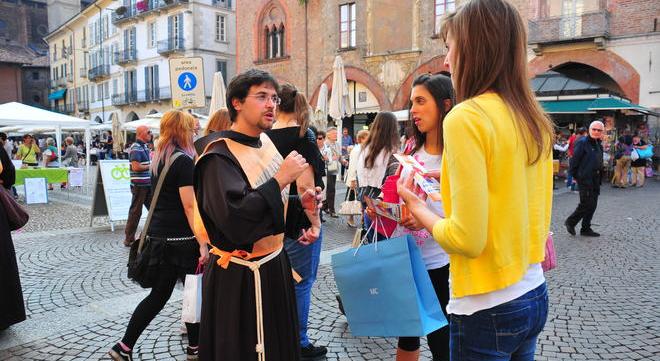The pandemic situation has placed religious life in a dilemma: how to reconcile isolation with the call to mission, and therefore the duty, to be close to people? Between the two poles of the question, of course, an infinite number of solutions have been given, but the very fact of having to face this dilemma has led to the most profound question: what is the role of religious life itself in our cities?
By “city” we mean the community of all the women and men who live in a territory, who are part of it, beyond religious, ideological, or other types of affiliation. And then what can religious life offer not for its own good, but what it offer through gestures of solidarity?
Now that we are timidly starting to get out and about again and as activities are resuming, the question should not be forgotten.
Questions in a time of testing
As is always the case in difficult situations, issues usually covered up by daily life come to the surface.
This is not a question of religious life being in crisis, but a question of finding a meaning that permeates even a daily routine when it is forced to close in on itself. Religious life, like a thousand other categories, has found itself blocked in many of the usual gestures of closeness and solidarity. Each type of service has experienced the limitation in different ways, and the difference between men and women will have considered.
The questions about religious life are not new.
The Council did not speak of religious life in terms of a “supererogatory”, but beyond this language it is difficult to find another word that effectively expresses the typology of the experience without, in fact, going back to a pyramidal image; the normal affirmation of evangelical radicality is actually a praiseworthy compromise. We all know that this expression is not limited to consecrated life, but it has been well accepted that it is a useful expression to describe religious life, taking it for granted that one does not want to hijack it.
After the Council we finally were acknowledged to be human beings and not angels, although committed by the vows of obedience, chastity, poverty! After a serious and praiseworthy phase of psychological investigation of the three vows themselves, spiritual reflection on them has waned, even though they continue to be vows, the existential places where consecrated life grows in joy and fatigue.
Almost sixty years after the Vatican Council we can return to the subject of the vows, without fear of wanting to express feelings of superiority.
The Council itself has opened us to interreligious dialogue, brought us into contact with other religious experiences that have monastic expression. This demonstrates that religious life shares anthropological aspects with which the human person can experience the transcendent. What is of value to all? It is the capacity of the human being to refer to something beyond oneself.
The question about the specificity of a Christian religious life is thus only moved a little further.
Again as a fruit of the Council, and also from the growth of civil society, we see the flourishing of lay people, who have dedicated themselves freely and generously, and in many cases alongside religious, in the most varied services on the peripheries.
At the same time every religious lives faithfully a lifestyle e in which the vocational dimension is very clear, even allowing for personal characteristics and history.
We could start by shifting the question and move away from a concern of the meaning for others, because that brings with it some performance anxiety, instead addressing the issue of meaning for religious themselves.
How to make memory of Jesus?
Perhaps it is more pertinent to ask ourselves not only how to remember Jesus, that is imitating him in a life that helps everyone to raise their eyes to God, but also to ask ourselves how is our starting point God, precisely because of the strength that the vocational dimension has in religious life. Is it not perhaps a way of living our relationship with him, with all our heart, with all our mind, with all our strength?
Religious life knows is definitely human. But at the same time we are made in the image and likeness of God.
In this way, even questioning takes on an evangelical character. It is not a question of a recognizable identity inside or outside the Church, but of fidelity to oneself in the conviction that these words, for everyone, can structure a life completely.
In this way Chastity becomes the way to live in a relationship of freedom with others and with a responsibility towards them, knowing how to become fathers and mothers who generate life. Obedience, in listening to the Gospel, finds the way to assume existence, to support being in the tiring dynamics of existence. Poverty indicates the way to the common good.
If religious life is an unusual form in the eyes of the city, we must not forget that the words that describe its life have become part of the lives of all citizens . At least for the West, it is often thanks to religious life that this has happened. Let us think, for example, that the monasteries preserved the democratic form of election, or let us remember what the religious life of the nineteenth century did in favor of the poor regards to education. Today, fortunately, some of the charisms of religious communities have become the common heritage of society and not only of the Church.
This makes the dynamism of religious life even more significant (or meaningful). Religious life is always attentive to becoming a more meaningful witness and, for this reason, it becomes a place of critical awareness. Religious life does not judge, but helps both religious everyone else to remember that no good deed ever exhausts the face of God.
The three vows can also be seen as mirroring the temptations which Jesus pointed out: wealth, power, the struggle against God, that is trying making oneself God. And because of this, they can help us recognize temptations when they are manifested.
Every woman and man is made in the image and likeness of God. It is this common trait that makes it possible for us to recognize each other. And for this reason, being Christian does not remove us from the human, not even when we give ourselves a particular way to see the world.
The widespread and shared mode of religious life, with a few exceptions, responds to the intention of provoking imitation rather than admiration. Are we sure that the model of the “pure and hard” consecrated person is so evangelical? Holiness “of excellence” is such if it responds to a vocation (which is individual and singular); otherwise it is narcissistic virtuosity. With the risk of being exposed there is an interior radicality that precedes and shapes the exterior one.
Certainly, when the distance between proclaimed radicality and lived radicality is a distinction and not a tension, credibility is at stake.
Public forms that are more “adapted” to the context probably testify less to the radicality of diversity, but seek a “critical sharing” of the life context in which they are embedded.
Prophetic dimension of the three vows
We can thus recover, without fear of false greatness, the prophetic dimension of the three vows, which in their giving are a sign of the support of faith to the hard journey of civil society for a more just city, towards all. They are appreciable as an effort of incarnation, as an attempt to testify to real and genuine possibilities of following, liveable and life-giving, unlike the models of religious life that seek asceticism in mortification. I remember the question when I was a postulant, asked by a believing, practicing and educated person: are you taking the usual vows? Those seemed to me to be enough. And then we all understood that adding more risks producing human distortions.
Religious life gives rise to public forms, but for them to be an invitation to “experience” – as possible for everyone, not just the best – how much life there is in following and how beautiful and pleasant it is for brothers/sisters to be together.
In this way a beautiful dialogue is established between vocations that we could say generate each other, following von Balthasar in The States of Life; which translated into everyday life could also simply mean the ability to listen to each other’s experiences as a school of life for living in the city and in the Church.
We conclude with a sort of profession of faith, a form in which each religious immediately finds oneself, the sense of the bond with brothers/sisters of the community and one’s being in the city.
I believe in God who gives everything and remains poor. He can only give himself in this way.
I believe in God who created us to give himself to us and asks to be welcomed as the God-with-us.
I believe in God who, in the Eucharist, does not give himself to “particular people,” but all to each person. And he asks to be received.
I believe in a chaste God: love given is given totally and forever. It is not asked for back, but it is required to be returned.
Sin, that is, the refusal to receive and return the love that is God himself, is mortal because it prevents God from being himself, that is, a gift to me.
God gives himself without pretension, without a desire to conquer or blackmail. He gives himself truly, loyally.
God is always a virgin: he loves me each time anew, as if it were the first time each time. For him, I am the only love of his life.
I believe in the obedient God: he delivers himself and puts all of himself into my response. He gives me all of himself and waits; if I do accept him, he has nothing left.
Since he chose to put himself forward wholeheartedly, he has forever and completely renounced being the almighty.
He escaped the idea of being enclosed in a name, until he himself gave himself a name, the only name: God-with-us. He can no longer be thought of without us.
And he is with us as the one who serves, as the Servant, as the obedient to the law. He obeys our laws, even to the cross: “obedient to the point of death and to the death of the cross.” From the things he suffered, from his heart he learned this obedience.
I believe in God, the Spirit of freedom. He who loves knows God. He who liberates is led by the Spirit.
I believe in the Spirit who loves my freedom and his freedom.
I believe that obedience to the Spirit is therefore the origin of my freedom, so that I may have life and have it to the full.

“Testimoni” es una revista mensual, publicada por el Centro Editorial Dehoniano, con sede en Bolonia, Italia. Su tirada actual es de unos 4.000 ejemplares. También está en línea.
Es una revista de información, espiritualidad y vida consagrada. Desde hace más de 35 años está al servicio de la vida consagrada con especial atención a la actualidad, a la formación espiritual y psicológica, a la información sobre los acontecimientos más importantes de la Iglesia y de los institutos religiosos masculinos y femeninos.
.





